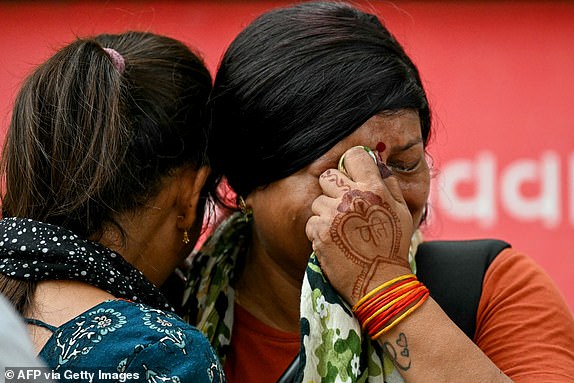On June 12, 2025, a catastrophic event unfolded in Ahmedabad, India, when Air India Flight AI171, a Boeing 787 Dreamliner bound for London’s Gatwick Airport, crashed just seconds after takeoff. The disaster claimed the lives of 241 passengers and crew members, with only one survivor, British national Vishwash Kumar Ramesh, emerging from the wreckage. The plane, carrying 242 people, including 169 Indian nationals, 53 Britons, and others from various countries, slammed into a medical college hostel, killing an additional 19 people on the ground. What began as a tragic aviation incident has since spiraled into a nightmare of mismanagement and heartbreak, as families report receiving the wrong bodies or discovering multiple remains commingled in coffins sent from India to the United Kingdom. The anguish of losing loved ones has been compounded by the agonizing realization that even in death, the victims’ identities have been violated.
The Crash: A Moment of Chaos
The flight, departing from Ahmedabad’s Sardar Vallabhbhai Patel International Airport, was intended to be a routine journey for passengers returning home or visiting family. However, within 30 seconds of liftoff, the aircraft experienced a catastrophic failure. Survivor Vishwash Kumar Ramesh, seated in 11A, later recounted to Indian media that the plane felt “stuck” in the air, with flickering lights preceding a violent descent. Video footage captured by a local teenager, Aryan Asari, showed the Dreamliner spiraling out of control before crashing into the hostel, erupting in a fireball that left the site shrouded in smoke and debris. Emergency responders, including ambulance driver Satinder Singh Sandhu, rushed to the scene, where Ramesh was seen stumbling away, his white shirt stained with blood. Despite his miraculous escape, his brother Ajay, seated nearby, perished along with nearly everyone else on board.
Initial investigations pointed to a potential issue with the plane’s fuel switches, which were found in the cutoff position moments after takeoff. A preliminary report from India’s Aircraft Accident Investigation Bureau (AAIB), released on July 12, 2025, revealed cockpit voice recordings where one pilot asked, “Why did you cut off?” only for the other to deny doing so. The report suggested that both engines’ fuel supply was halted and briefly restored, but the plane’s descent could not be arrested. Aviation experts, including safety specialist Geoffrey Dell, have questioned how both switches—protected by a metal bar and requiring deliberate action—could have been flipped accidentally. The black box data, still under analysis, has yet to provide conclusive answers, leaving many to wonder if human error, mechanical failure, or a combination of factors was to blame.
A Survivor’s Grief and a Community’s Loss
Ramesh’s survival was hailed as a miracle, but his ordeal did not end with his escape. Discharged from the hospital with bandages covering his burns, he carried his brother’s coffin through the rain-soaked streets of Diu, a coastal town that lost 14 of its residents in the crash. His mother, walking beside him in a blue sari, and the gathered mourners reflected the deep communal grief. Ramesh’s attempt to re-enter the burning wreckage to search for Ajay underscored the desperation felt by those who lost loved ones. Across India and the UK, families gathered outside morgues and hospitals, offering DNA samples in hopes of identifying the charred remains, a process complicated by the intense heat from the plane’s 125,000 liters of fuel.
The crash’s toll extended beyond the passengers. Students eating lunch in the hostel’s cafeteria, a tea seller’s son delivering food, and a grandmother with her toddler granddaughter were among the ground victims. Stories of loss emerged quickly: Hardik Avaiya and Vibhooti Patel, a couple celebrating their engagement, perished alongside Prateek Joshi, a radiologist from Derby, his wife, and their three young children. In Leicester, where many British-Indian families reside, the community mourned collectively, with temples and mosques paying tribute to the departed. Yet, the tragedy took an even darker turn as reports surfaced of misidentification and mishandling of the deceased.
The Misidentification Scandal
By mid-July 2025, a shocking revelation emerged: families in the UK had received the wrong bodies or found multiple remains in single coffins. Miten Patel, whose parents Harshit and Pooja died in the crash, discovered “other remains” in his mother’s casket during a coroner’s examination in London. The mix-up, he said, left him questioning how many others might be affected. The Daily Mail and posts found on X highlighted similar cases, including one where a family received an entirely different body and another where several victims’ remains were commingled. Lawyers representing the families accused Air India and Indian authorities of pressuring grieving relatives to complete complex questionnaires without legal guidance, implying that compensation depended on compliance.

India’s foreign ministry responded on July 23, 2025, asserting that all remains were handled with “utmost professionalism” and that they were collaborating with UK officials to address the errors. However, the ministry’s statement did little to quell the outrage. Critics argue that the DNA sampling, conducted by Ahmedabad’s Civil Hospital rather than Air India, may have been rushed or poorly coordinated, especially given the scale of the disaster and the condition of the bodies. The lack of transparency has fueled skepticism about the official narrative, with some families questioning whether the government is covering up systemic failures in the identification process.
Families’ Anguish and Calls for Accountability
The emotional toll on families has been profound. Imtiaz Ali Syed, whose brother Javed, sister-in-law, nephew, and niece died while visiting India for Eid, described the pain of waiting for their bodies, only to face further distress over potential misidentification. In Wellingborough, Raj Mishra, the mayor, offered condolences, but many felt abandoned by both Indian and UK authorities. Hamzah Nanabawa, mourning his brother Akeel, sister-in-law Hannaa, and niece Sara, criticized the lack of support, calling for government intervention. The cancellation of funerals due to the wrong remains being sent home added a layer of humiliation to their grief.
Legal representatives have demanded that UK Prime Minister Sir Keir Starmer raise the issue with Indian Prime Minister Narendra Modi during his upcoming visit. They argue that the families deserve not just answers but assurances that such errors will not recur. Air India, owned by the Tata Group since 2022, has faced scrutiny for its handling of the aftermath, including reports of canceled flights and technical issues with its Boeing 787 fleet. The airline’s promise of $180,000 in compensation per victim has been overshadowed by accusations of insensitivity, with one lawyer calling their behavior “outrageous.”
A Critical Look at the Response
The official investigation, supported by the US National Transportation Safety Board and UK experts, has been slow to provide clarity. The focus on the fuel switches has raised questions about whether Air India neglected a 2018 FAA bulletin regarding potential disengagement issues, though the airline maintains it followed safety protocols. Meanwhile, aviation safety advocate Mohan Ranganathan has pointed to broader systemic problems, including inadequate airport safety standards and weak oversight by India’s Directorate General of Civil Aviation. The proximity of tall buildings to the Ahmedabad runway, just 300 meters away, has been cited as a possible contributing factor, yet no definitive action has been taken to address such risks elsewhere, such as in Mumbai.
The misidentification scandal further erodes trust in the authorities’ competence. While the Indian government blames the complexity of DNA matching and the condition of the remains, families and observers question why such errors persisted despite round-the-clock forensic efforts. The involvement of multiple agencies—hospital staff, police, and international teams—may have led to communication breakdowns, but the lack of accountability has left a bitter taste. Posts found on X reflect public sentiment, with users expressing shock and demanding justice, though these claims remain unverified and should be treated with caution.
A Lingering Wound
As of July 24, 2025, the investigation continues, with the final report expected in a year. For the families, however, time offers no solace. The crash not only ended lives but shattered the dignity of the deceased and the peace of those left behind. Anil Ambalal Patel, who lost his son and daughter-in-law, kissed their photos before their funeral, a poignant reminder of the love now lost to bureaucratic failure. The question lingers: was this avoidable, and can the system be trusted to prevent future tragedies?
The Air India crash is more than a statistic—it is a story of human suffering exacerbated by human error. Until the full truth is uncovered and justice served, the wounds of Ahmedabad will remain open, a testament to the fragility of life and the resilience of those who endure its harshest blows.



